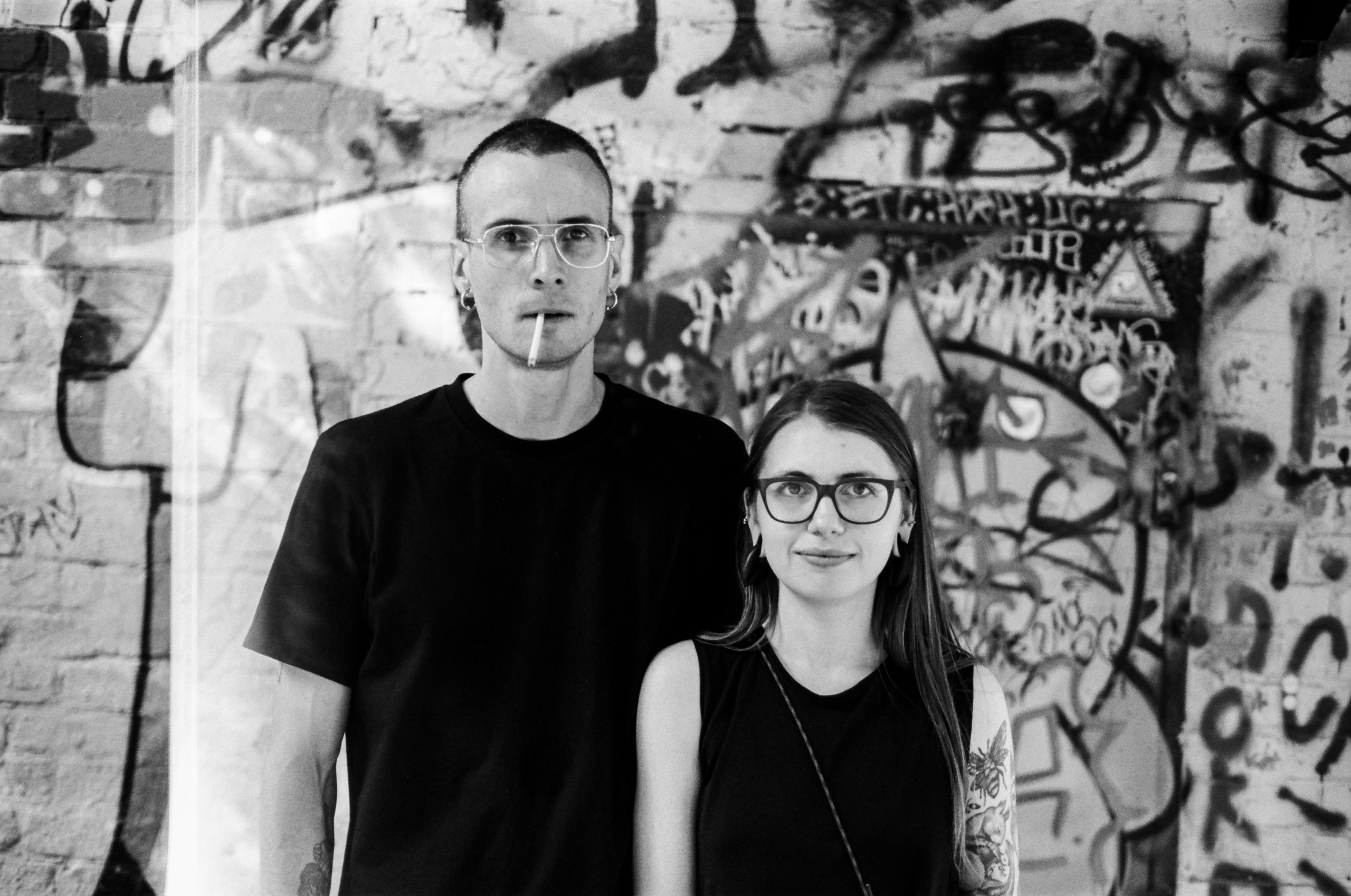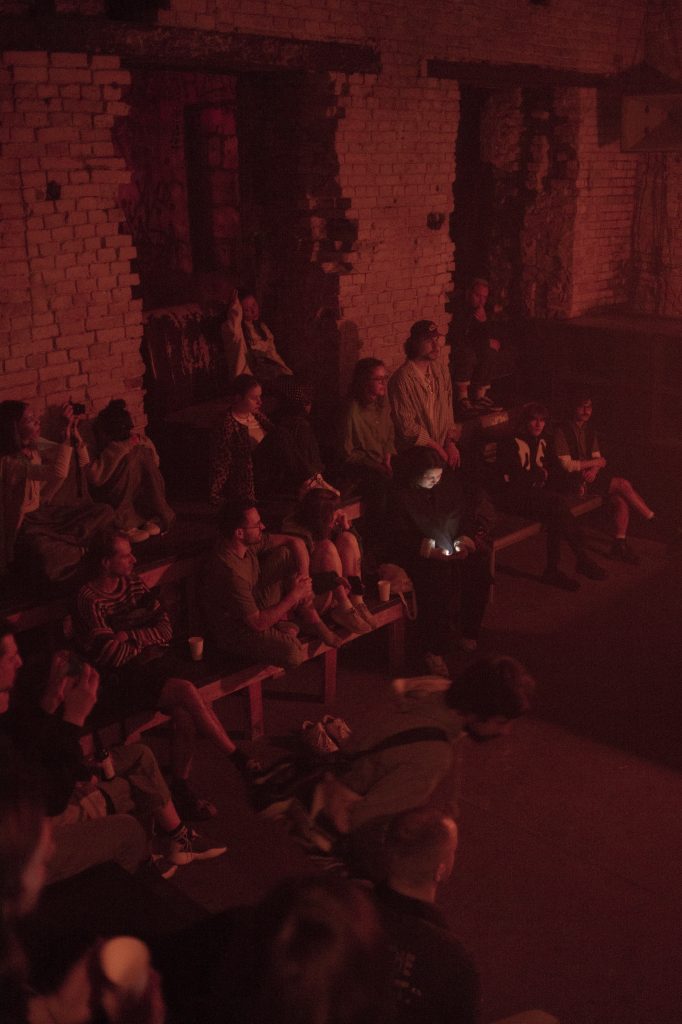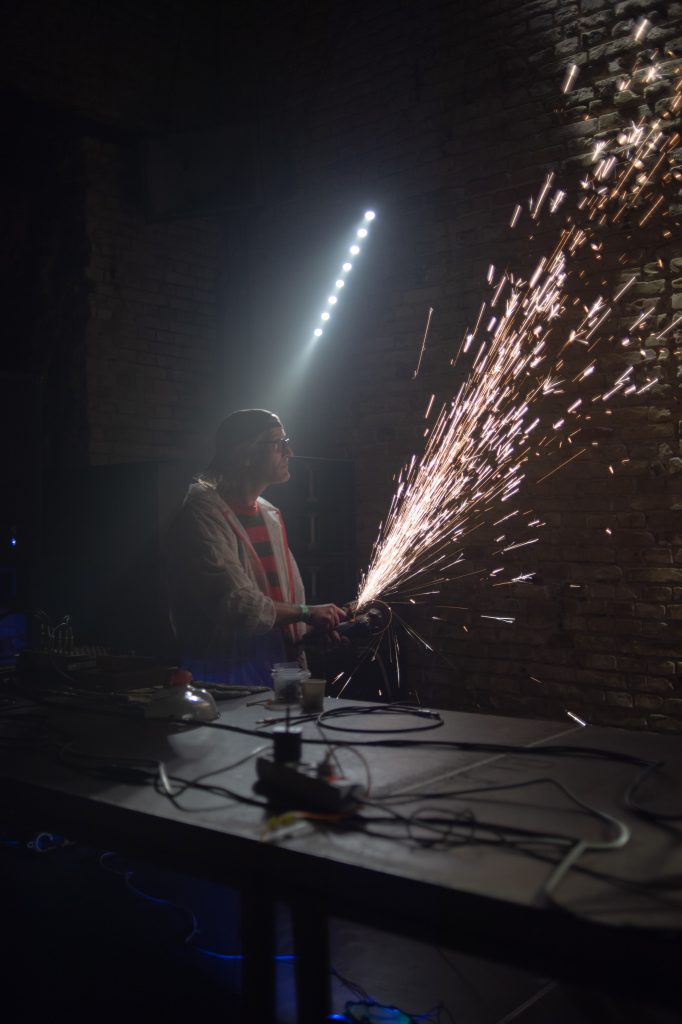Noise Every Wednesday: A Lesson in Sustainability From Kyiv’s Experimental Scene
Published April, 2025
by Olena Pohonchenkova

A series of events with an open concept and ceaseless adventurism has been tie-forming and genre-bending for the post-2022 explorative music scene of Ukraine’s capital. People in charge of Wednesdays, Kseniia Yanus and Vadym Oliinykov, tell the story of the most sustainable long-duration performance in Ukraine.
This is the 67th event in the Noise Every Wednesday series (although the name of the event in Ukrainian only takes two words, the NEW abbreviation feels right, so from now on I’ll use it in this article) that literally takes place every Wednesday in Kyiv’s Otel’ club: the lineup is unusual but everyone says it’s unusual in a classic way. Before the start, a small smoking crowd at the door bets on today’s best act: with only one of the three, Oleksii Podat, being visible on the explorative electronic scene of the past few years and having records out, it seems like an easy task. However, it’s not that simple. “Most of the time, you will have never heard of two out of three artists, and sometimes you don’t know anyone, you just come because it’s Wednesday”, a friend tells me. This adventurous spirit, both among musicians and the welcoming crowd, is part of Noise Every Wednesday’s attractiveness.
Right there, at the door, I get a NEW 101 on today’s lineup. Letovchenko, the opening act, has been a part of Kharkiv’s club scene with deep house and techno sets, but this time he abandons the steady rhythm for filtered textures, sparse percussions and deep drones slowly fading out. The set is too delicate to sound loud, but the sound system perfectly catches all its little twists and bends, leaving the impression of a foggy trance festival where you can’t find the DJ booth. There are still very few people around, most of them hanging around the table, drawn to Letovchenko’s setup, making me guess whether there are NEW artists (perhaps potential ones) among them. A young woman sits on a sofa high above the stage and draws something in her sketchbook under dim brown and blue lights. The performance space here is an anti-stage, rather a pit from which the sound comes up, level by level, and you get to choose the depth of immersion.
Noise Every Wednesday is the most sustainable experimental music event in post-2022 Ukraine and it was planned like this by the musicians and cultural workers Vadym Oliinykov and Kseniia Yanus. The idea for the long-duration performance hads been brewing since the mid-2010s. “Around that time we started getting into electronic music”, says Vadym who originally comes from a hardcore punk background and kept its communal ethics in electronic environment, “we understood that the huge new market of synthesizer hardware just popped up, it was 2014-2015, lots of cheap gear appeared on the market and with time, there was more and more of it. On the Internet, the segment of people interested in this stuff also grew exponentially. At the same time, Ukrainian club life was mostly just DJ sets, about 85-90% of it, but there was this immense parallel dimension where people played new kinds of experimental electronic music, and they needed a place to play it”.

“Secondly, the middle of the week in clubs is a cheap slot, they just stand there empty, which makes the events inexpensive. It was all there. We just put two and two together and decided to try. Also, we thought that if the party in Podil district starts at 7 PM, we would either get the Podil crowd here (and they’re cool) or some kooky people from other Kyiv neighbourhoods would come, the ones interested in this kind of music. Either way, we would be able to get ourselves a high-quality audience, and that’s exactly what happened”.
The place itself, a club named Otel’, plays a big part in NEW’s sustainability: situated in Podil’s industrial area, which has been reorganizing into a grassroots creative cluster since the mid-2010s, its austere interior has been hosting all kinds of events, from techno parties to metal gigs. For Pavlo Derhachov, the club’s founder, Otel’ is part of the non-glamour club network that emerged in post-Maidan Ukraine with the big electronic live music outburst. In 2014, it held the first CXEMA party. Just as another Kyiv cult spot, Closer, it’s situated in the space of the ribbon-weaving factory on Nyzhnoyurkivska Street but occupies a smaller building that used to be a boiler house (Otel’ is a wordplay on Ukrainian ‘kotel’, a boiler). Derhachov seems omnipresent here, shouting Vadym’s name from one corner of the club, the next moment saying hi to someone at the door. He did the first basic repairs in the club for his own money and only with some friends’ help. “During the first year, I was even cleaning the space myself”, he says on ОТЖЕ (Ukrainian for “so”) podcast. He also played a set at one of the NEW events with half-cooked material and was impressed with the audience’s openness and the absence of format or genre pressure.
The looseness in the event concept echoes the club policy. “We started with a concept that was strictly technical”, Vadym continues, “a three-hour event with three artists playing from 7 PM to 10 PM, we also decided not to exclude anyone. The only question we had at the start was whether it would be Wednesday or Thursday. That’s how the name came. We stopped there, that’s the whole concept you need for such an event.” It was like that already during the first cycle of concerts, remembers Kseniia: “We had a six-event-long test period in a Wildstone bar that used to be here [at the ribbon-weaving factory] as well. There was room for 50 people max, and we only gathered maybe 20. In Otel’, it started with 40-50 people. This past month, we got 180 people on average. Regularity works, it gets more and more different people to the event”. Vadym adds: “And there’s also a Kyiv vibe that’s common for everyone, even if the music differs, the lineups here always work”.

NEW crosses paths of different crowds and scenes: the second slot of today’s concert is given out to Kelsis, a young trio in funny tees (one of them saying “I don’t pay taxes, I do Kelsis”), with Kristina Shevchenko, an easily recognizable guitarist and vocalist of Kyiv’s indie rock band headachee, among them. “This band debuted at Noise…”, Kseniia enthuses, “I’m not sure if they performed with this project anywhere else. We’re proud to have this whole pool of artists that played at NEW first and then went to perform elsewhere, other cities included”.
For the band with a genre tag “kelsis” on the poster, this whole performance is a big fat chunk of fun: they play several synths, forming sequences on the go, clashing random noises and samples, layering the whole thing into a cacophonous mess only to put r’n’b drum sample base under it and elegantly restructure the sound canvas the next moment. Their stage presence has the effect of a Luna Park ride, where not all the attractions are in perfect order, but it makes the experience even more exciting. The crowd is smiling and laughing now as Kelsis ends up with two Babyfather tracks, played back to back.
“This can be compared with Bataille or Burroughs’ concept of cultural contagion: you don’t aim at making a huge impact at once, but if you do something regularly, people get interested, they start doing it too”, Vadym reflects. He and Kseniia come from Donetsk, a city that’s been occupied by Russia since 2014. In Kseniia’s essay for the Neformat website about the couple’s hometown she mentions getting the money back for the Psychic TV show in Kharkiv and spending it on the tickets to Uzhhorod, the furthest western regional center, where they moved not long before the first stage of the Russian-Ukrainian war broke out.
“We first faced more radical, heavy electronic music in Donetsk. There used to be amazing drum-n-bass raves there. I went to my first noise concerts there too. Also, there was this really powerful death metal, grindcore, black metal scene in Donetsk. It was heavy, marginal, with a crazy, dangerous audience, but the experience was always great. This was our school.” When asked about the continuity of this eastern Ukrainian, radical tradition in the capital, both Kseniia and Vadym shrug their shoulders: “Well, there’s always one artist in the lineup that makes it heavy for the audience”.
This time the uncomfortable spot is saved for act three: the bare-boned drama by Oleksii Podat. It starts as a hectic nightmare, with distant train horns and disturbing atonal rambling, and gradually leaves the barely drawn plot behind, balancing around the fractures in the texture, making both the noises and the silences feel harsher. It’s a short and sweet set, less than 40 minutes long, quite different from everything Podat recorded and released. NEW is much appreciated as the space for trying and failing, or not failing and keeping it together despite all. Some of these experiments never leave the Otel’ room, others are on the NEW YouTube channel.
“Noise” in the title is not about the genre per se. When Vadym tries to cover the genres represented at NEW events, he comes up with the umbrella term “noisy electronics”, then adds, “but it could be an acoustic instrument as well”. NEW is a playground for things not yet formed or named, whether it’s anti-music or something that boils beyond genre marks and, in many cases, stays there, never actually becoming “music”. For NEW, being on the margins means catching all the sound flies in its net. It can be a noise operetta by Clemence Poole or a circuit-bending performance by Ereh Saw. Kseniia and Vadym have an industrial noise live project YouzMuzak, which completely differs from their studio minimal synth endeavour Bez Gruntu, and occasionally perform at NEW and other friendly events.
When I ask Vadym whether my thought about noise as the sound on conventional music’s margins is relevant, he answers with a music tip: “Listen to Merzbow’s 2024 album: you’ll hear IDM, post-ambient, but you won’t hear just noise. I mean, in experimental electronics, noise electronics, and simply electronics… the boundaries are volatile. I would love to see more of harsh noise wall or power electronics at NEW, static noise maybe… but we have lots of noise electronics, at every event there’s something atonal, with complicated rhythmics… so yeah, it’s all noisy.”
NEW’s openness works on both ends: the entrance is a free donation so it’s affordable for anyone who happens to be in Kyiv on Wednesday, and after the event ends, you still have time to catch the last metro (which I did) and get home before the curfew. “Our economy is simple: week by week we manage to break even. We donate part of the proceeds to Кожна тварина (Ukrainian for ‘every animal”), an organization that makes vegan field rations, and the rest we divide between artists, the light engineer and other personnel. Last year we covered the expenses of 10% of all the vegan field rations that they sent to the front.”
After leaving Donetsk Vadym and Kseniia have been living in different parts of Ukraine, taking part in the music and activist life of Uzhhorod in the west and Odesa in the south. They believe the sustainability of an event like NEW requires time and enthusiasm, but it is not out of reach for other cities. “We’d love to bring NEW to other parts of the country. We even made an offer to our colleagues in Lviv, we’re ready to give out this formula to someone else, like some kind of franchise, but those guys were not ready to accept it. We haven’t found the people that would agree to do that somewhere else”, says Kseniia. “There’s always been noise in Ukraine, what we do with NEW is just an outbreak, maybe the brightest one at the moment”.
Text: Olena Pohonchenkova
Photos: Alina Pleska (header photo), Timur Jafarov
This article is brought to you as part of the EM GUIDE project – an initiative dedicated to empowering independent music magazines and strengthen the underground music scene in Europe. Read more about the project at emgui.de.
Funded by the European Union. Views and opinions expressed are however those of the author(s) only and do not necessarily reflect those of the European Union or the European Education and Culture Executive Agency (EACEA). Neither the European Union nor EACEA can be held responsible for them.